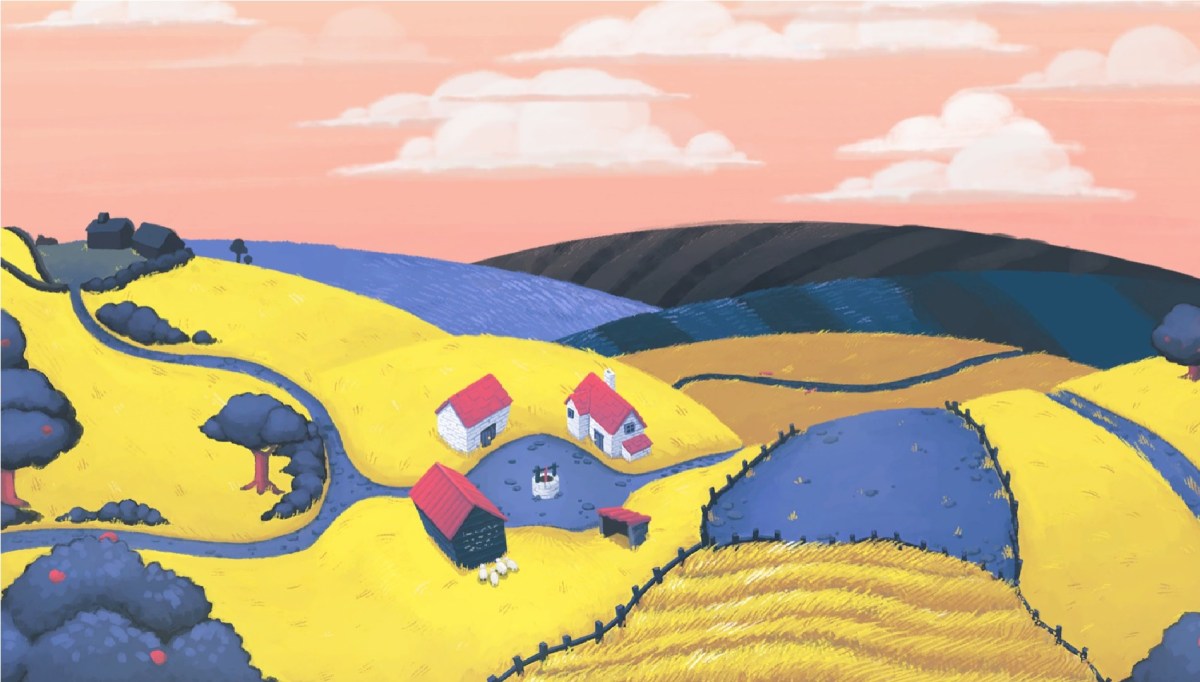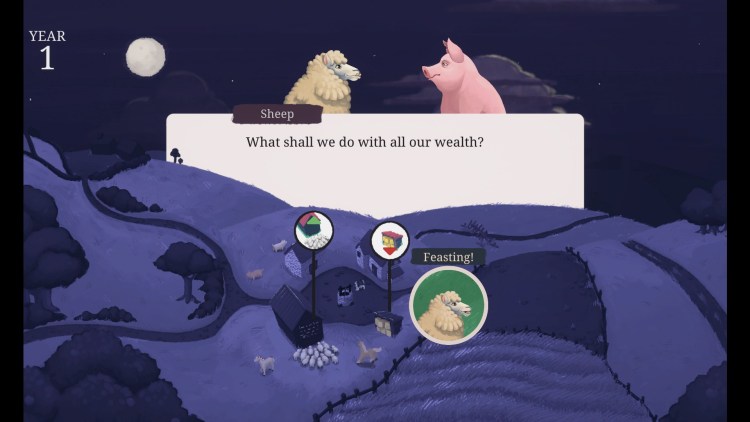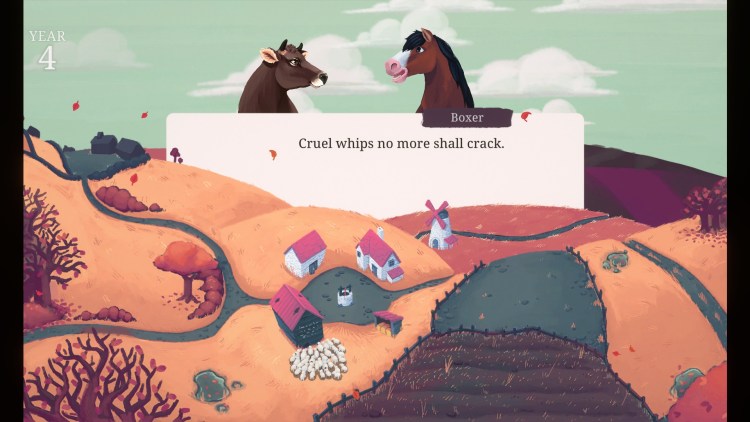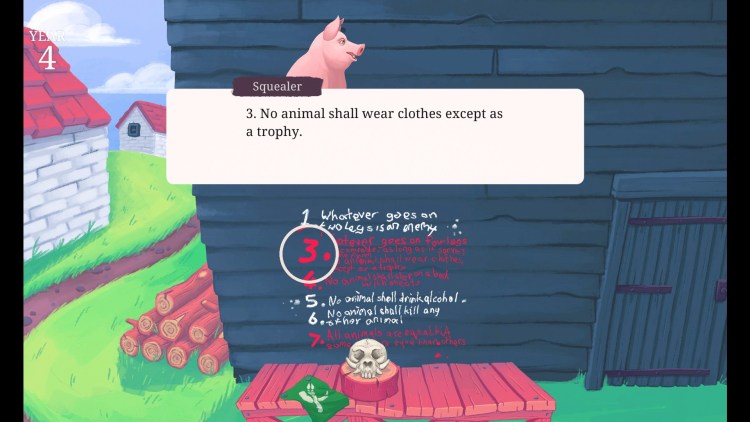Orwell’s Animal Farm is all the fun of high school literature class with less reading and substantially more stress. Why Animal Farm needed this interpretation was beyond me, but its charm and simplicity have since won me over. The virtual distillation keeps the novella’s subtext intact, tasking a few basic mechanics with driving home its themes. The turmoil of a revolution gone wrong is conveyed through nothing more than a few mouse clicks and quick decisions. It’s flawed and frustrating, but there’s an undeniable elegance to the game.
Nerial’s rendition of George Orwell’s classic comes in the form of a casual resource-management game. It boosts a crispy, storybook-style look, resting on the same page for the entirety of the game. All the action happens on the farm, and there the entire game takes place. Your goal is clear: ensure that Animal Farm flourishes forever, spreading the good word of Animalism across the world. Although, we know how the story goes, so the motivation instead comes from collecting all the outcomes.
Tired of the oppression they face, the animals decide to honor the dying wish of the wise pig, Old Major. They revolt against their human master and chase him off the farm. Now free from tyranny, the pigs oversee the farm animals’ new lives, creating seven commandments. But as times get tough, greed consumes the pigs, leaving the other animals at the mercy of their new masters. Orwell’s Animal Farm relegates to you the impossible task of holding the community together.
Food for thought
The studio is no stranger to simplicity, if its work on the Reigns series is any indication. The game cycles through a small list of obstacles that present themselves as time passes on the farm. Across the four seasons, different tasks like sowing seeds, harvesting, and repairing structures drain your resources. Dealing with these problems is as easy as choosing an animal to carry out the task. However, as their health dwindles under the weight of all their responsibilities, more severe issues rear their heads.
At the heart of your work is balancing Animalism (morale), supplies, wellbeing, and defenses to fend of humans. Every event is an opportunity to increase a resource, usually at the cost of another. Every animal represents a choice; choosing one means potentially upsetting them, or sacrificing their wellbeing to achieve another goal. Upsetting certain animals may lead to their departure, or worse. But, failing to keep up with your supplies and defenses is a sure-fire way to prematurely end your playthrough.
The running theme throughout your time with Orwell’s Animal Farm is sacrifice. If you force Boxer into too many tasks, he might not be around for long. If you upset one of the pigs, they may begin conspiring against the others. Each animal has their own personality and ideology, which provide insight into how they should or shouldn’t be utilized. In building these connections to the characters, you grow more invested in their wellbeing and happiness. I did everything in my power to save my favorite farm animals, but difficult choices had to be made.
Until the cows come home
There’s an opportunity to reflect on your choices at the regularly scheduled barn meetings. Here, you can gauge the tension and hear concerns, while deciding on future action. Napoleon and Snowball, the two shot-callers of the farm, spend a good chunk of time engaging in verbal warfare. Crucial decisions made here have long-lasting impacts on Animal Farm and its leadership. As events continue to unfold, more and more animals adopt a pessimistic outlook. The energy in the room slowly drops as the walls (quite literally) start coming down.
Despite adhering to the general structure of the novella, Orwell’s Animal Farm is rife with exciting outcomes and opportunities. Your success on the farm can entice other animals to abandon their farms and join yours, for example. You can teach animals how to read, making them privy to the pigs’ deception and changing the farm dynamic. You can alter various key events outright, or at least delay them for as long as possible.
Things eventually go sour, and the game challenges your control. In many ways, you too are at the mercy of the pigs. It’s often unclear what decisions led to certain outcomes, or what you could’ve done differently — it just happens. The game provides you with enough agency to give you the illusion of control. In half the scenarios you’ll find yourself in, this blanket of obscurity does a great service to the theme. And in the others, Orwell’s Animal Farm morphs into a bit of a cumbersome experience.
The future is bleak
Because everything generally goes the way of the book, the decision-making is rendered near-useless on many occasions. Animal Farm‘s system makes concessions to the plot of the book. The resource management approach has a lot of merit and is generally a well-implemented feature. However, the lack of consistency and predictability constantly undermine the agency of the player. This makes for more of a frustrating experience than an educational or thought-provoking one.
Many other elements tied to success are also kept away from you. Measuring the wellbeing and mood of your animals is a challenge without enough visual aids. Dialogue and events repeat frequently enough to confuse you on the status of certain animals. Many subsequent playthroughs of mine have lead down the same path, despite my best efforts to explore the other extremes. Ultimately, the goal of Orwell’s Animal Farm is to trial all these different decisions. Siding with different animals prompts new dialogue and scenarios, but some decisions are more equal than others. I just can’t seem to pinpoint which ones those are.
There might be a “good” ending, but I certainly haven’t seen it. Perhaps that’s part of what keeps you playing, though it may be futile. Much like the animals of Animal Farm, I was excited by the prospects and confused by the outcomes. That isn’t to say a touch of surprise wasn’t beneficial to my experience. Overall, Orwell’s Animal Farm competently translates the story to the video game medium. While it’s difficult to say whether a few hundred clicks and decisions can replace 30,000 words, the game successfully captures the spirit of Animal Farm through simple interactivity.










Published: Dec 10, 2020 09:00 am